
[ad_1]
Exactly a year ago, England’s fourth successive defeat in the Calcutta Cup led to an inquest in York which sparked a strategic revolution. Remember that? Sadly, the last traces of it had vanished at Twickenham in this grinding escape act.
Rewind 12 months and a brave new era of attacking ambition was being launched. There were glorious glimpses of it in the epic win over Ireland, before the overhaul was fully and vividly showcased in a narrow defeat against France in Lyon a week later. That was a loss which felt very much like a win, which was the opposite of this unconvincing event.
England have regained a precious knack for closing out tight games which is welcome and is all that counts in the history books. It will be logged for eternity that the Calcutta Cup was wrested back in 2025 and that is absolutely the prime objective in a results business. Better to be debating the fine detail while England are still in the title hunt, than praising their style and swagger in defeat.
Yet, it seems surreal to consider them as bona fide title contenders on the back of this game. One team played with ambition and conviction, flow and flair, but England beat them. Or, to be precise, Scotland came agonisingly close to a record fifth successive win over these neighbours – only for Finn Russell’s three missed shots at goal to ensure a handover of the trophy.
It was a joy to watch the visitors, especially in the first half when they led the hosts a merry dance and threatened to storm into an unassailable lead. But they are now one from three in this campaign and staring down the barrel of another bottom-half finish, which is not reflective of their quality and game-breaking threat.
England managed one try to their rivals’ three and, frankly, it shouldn’t have been awarded. Tommy Freeman didn’t get the ball down and he knows it. At least he was gracious enough to admit as much, with his eyes and expressions, if not with his carefully chosen words.
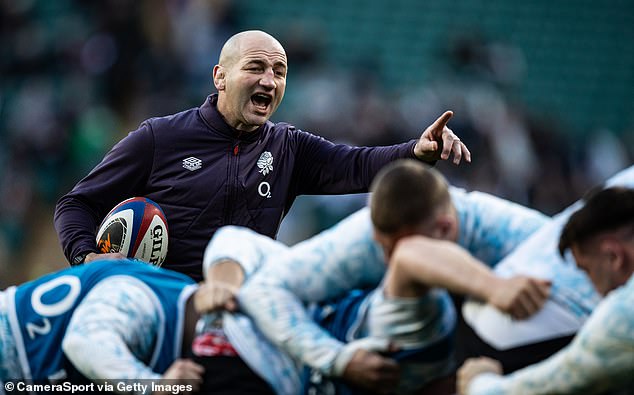
England beat Scotland in a grinding escape act that raised questions over their attack again
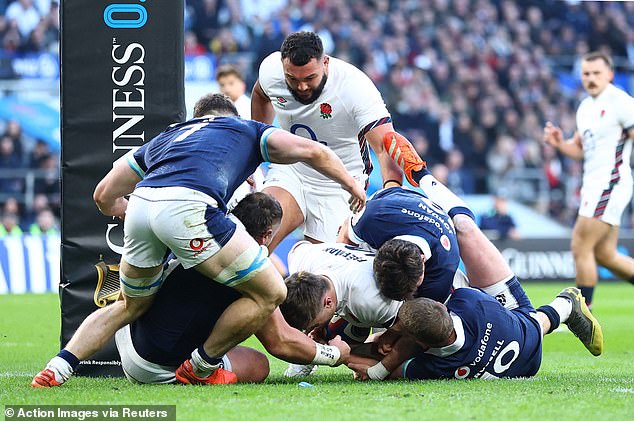
Tommy Freeman knows that he didn’t get the ball down for England’s sole try of the encounter
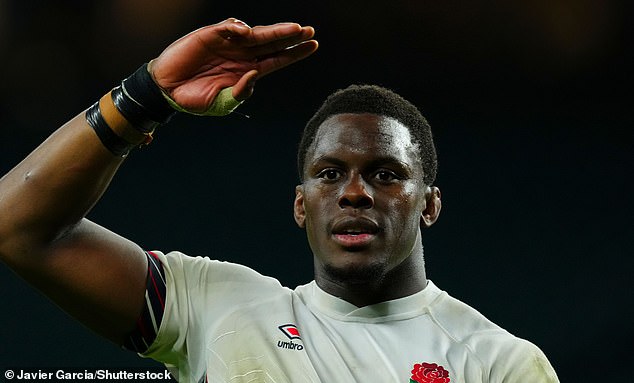
Nonetheless the hosts came away with the Calcutta Cup and a second victory in three games
Look at the way this messy but absorbing encounter ended. Gregor Townsend’s men were chasing the game and they conjured a chance then took it – on a day when their red-zone conversion rate was not up to scratch. But at least they were creating, because England certainly weren’t, which is why they were being booed after half-time.
This is the irony and the infuriating issue. The national team have rediscovered the ability to win tight games, by hook or by crook – using a well-earned dose of luck if necessary – but they have largely lost the precious gift for engaging and inspiring their audience. It happened in the closing stages against France, when Twickenham was rocking, but not this time.
Watching England is akin to being stuck in a café with an either-or menu and no option to combine elements which should go well together. Bacon or eggs. Sausage or mash. Apple pie or custard. Compelling rugby or a victory. ‘Can I have both?’. ‘No, sorry – can’t be done.’
Cast minds back a year and the revolution was dazzling. Playing fast and flat to the line, they carved France apart at will and were similarly deadly in positive patches against the All Blacks in New Zealand. They unleashed George Furbank and Immanuel Feyi-Waboso. They took risks. They spread panic among opponents. They set pulses racing.
They talked of aggressive intent and they meant it. Now, they still talk about it but then send the ball skywards unless the opposition are in a heap in front of them. The contrast with Blair Kinghorn, Kyle Rowe and the mighty Duhan van der Merwe running amok before half-time on Saturday is stark. One team exhibited had natural instincts and exuberance, the others appeared rigidly committed to training-ground drills and detail, while stuck in straightjackets – but they won, so does it matter?
It does if England want the public with them. People pay good money to see more than just ‘kick it high and wait for errors’. That can’t be the extent of the plan. It smacks of extreme analysis and forensic micro-management of everything the players do. In there somewhere are gifted individuals waiting to burst out, as they did almost 12 months ago in Lyon.
All the post-match talk was of running hard, commitment in defence, set-piece control and battling spirit. These were undoubtedly core attributes of this English win. In the second half, some of the defensive sets saw the visitors pounded back by a tide of tackling force which was a remarkable sight and a testament to the collective resolve. There is a band-of-brothers feel in the ranks and that much was demonstrated by this performance.
But these are Test staples. They should be seen as non-negotiable, base-level requirements. England are so frustrating to follow as they never lack heart and soul, but can’t quite stitch together all the core requirements to reclaim a place among the elite. Impressive tackle counts and GPS data are promising indicators, but after weeks in camp it is reasonable to expect flow and flair and a hint of daring intent too.
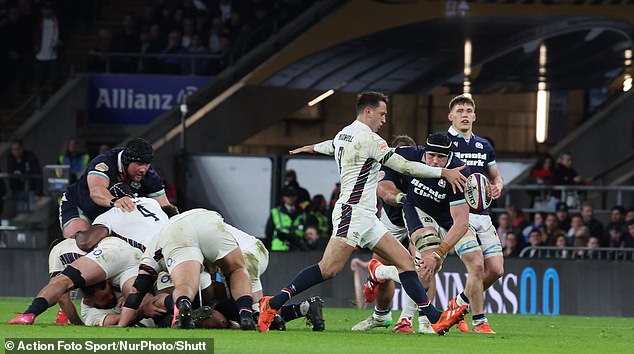
England sent the ball skyward with infuriating regularity and were booed at half-time
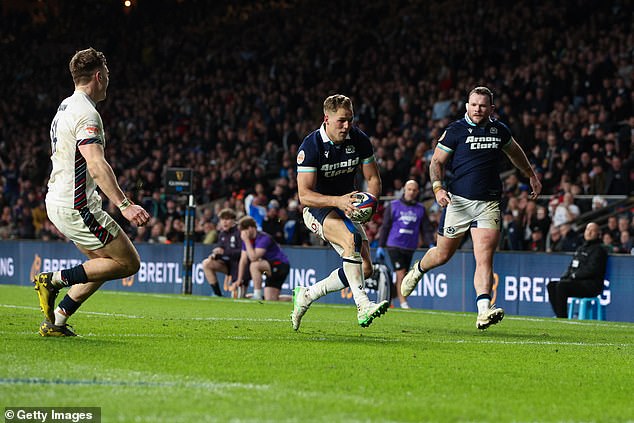
Scotland scored three tries to England’s sole score, and as it stands England’s attack won’t be enough to beat the best
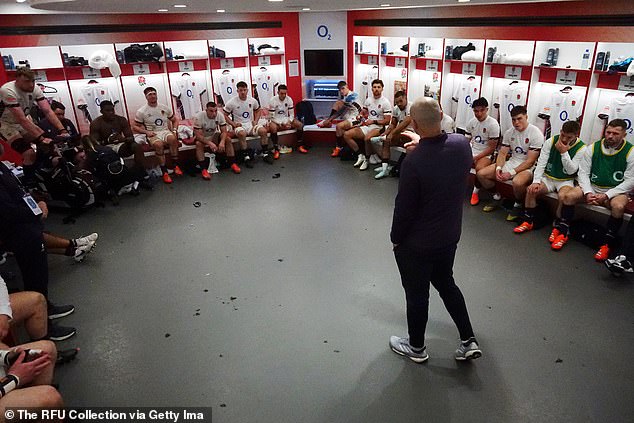
There were few vestiges of the flare and fluidity produced by a crisis meeting in York last year

Only the poor kicking of Finn Russell spared England, who came close to defeat in the final seconds of the game
The uncomfortable truth is that this won’t be enough to beat the best. It wouldn’t beat Ireland, it wouldn’t beat France – the real version, not the recent imposters – and it might not even be enough to beat Wales in Cardiff on the last weekend of the championship, if they continue to revive under Matt Sherratt. That final Saturday could be anything but Super for England if they rely on wriggling off the hook.
There are many ways to win and at least that is what Borthwick’s side are doing, but that doesn’t mean people have to love all of those ways. They loved the revolution. They don’t love caterpillar rucks and a box-kicking barrage. If rugby has to be as turgid and structured as the hosts made it on this occasion, it might be best to play it in private and just send out stats by email at the end.
The head coach became tetchy when pressed on why England had abandoned their daring streak in attack. Borthwick spoke yet again about how long it takes to build necessary cohesion. But his team, which is two and a half years into his reign, managed it rapidly a year ago; from the launch week in York to the glittering showcase in Lyon just three weeks later.
That was a loss and this was a win, so perhaps that is the only progress which counts, despite the sense of a tactical regression. But England lost that game via a late kick and could have suffered the same fate on Saturday.
They will return to York this week and need to resurrect the mood of introspection which gripped them there a year ago and brought forth such an eye-catching transformation. It is high time for another revolution and tactical liberation.
[ad_2]
Copyright for syndicated content belongs to the linked Source link

